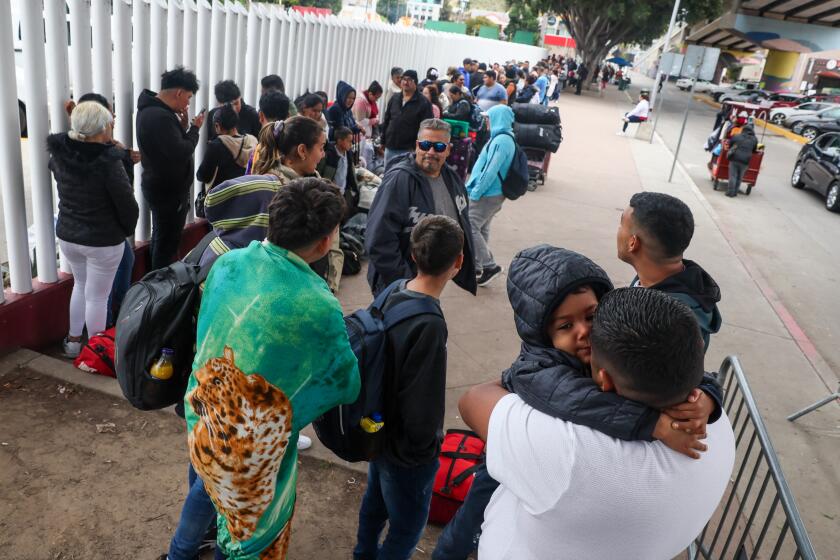INS Seeks $175 Fee for Alien’s Legal Status
The Immigration and Naturalization Service has decided to charge each adult illegal alien seeking legal status in the United States $175 and to charge $400 for an entire family, Justice Department sources said Thursday.
The application fees, which the INS will propose in regulations expected to be made public next week, are less than the maximum that immigration officials had been considering. But immigrant rights activists, when told of the plan, complained that the fees are still too high. INS officials argue, however, that the advantages of legal status should offset any financial sacrifice.
The debate over the cost of legalization epitomizes the clash of values between those who say they do not want to “cheapen” U.S. citizenship and those who believe it should be affordable to the people who are being offered it under the landmark immigration law passed last year.
Beginning May 5, the INS will start accepting applications for legal status from illegal immigrants who have lived in the United States continuously, except for brief absences, since before Jan. 1, 1982. In addition, agricultural employees who worked at least 90 days in the year that ended last May can apply.
The INS estimates that about 4 million illegal immigrants will apply for legal status.
It is impossible to determine how many of those prospective applicants will be unable to afford the fees. However, Joseph M. Trevino, executive director of the League of United Latin American Citizens, said a majority of illegal immigrants apprehended last year had family incomes below the poverty line.
Two-Step Process
Under the proposed regulations, a family of two parents and three children younger than 21 would pay $400 to apply for temporary residency, the first step in a two-step process that could lead to citizenship. Each parent would pay $175, while the first child would be assessed $50. The other two children would be charged nothing.
However, if any children in a family were older than 21, they would have to pay $175 like other adults.
“The assumption is that they would be earning an income,” one Justice Department official said.
In addition, officials said, the INS has not decided whether to charge a second fee when immigrants apply for permanent residency, the second step toward citizenship under the legislation.
But officials of several immigrant interest groups said that the application fees, when combined with a number of other costs that immigrants face under the program, will put legal status out of reach for many.
Additional Fees
According to several organizations monitoring the new program, additional fees that applicants must pay include at least $50 for a required medical examination, about $25 to copy identification documents and an undetermined fee of up to $75 to a private church group or other agency authorized by the INS to assist in the program. Moreover, the fee likely would be much higher if an applicant sought advice from a private attorney, representatives of the groups said.
“That’s a lot of money for people who are not affluent,” said Gilbert Paul Carrasco, associate director of immigration affairs for the U.S. Catholic Conference. “You’re talking about a population that often works for minimum wage or less, and the agricultural workers are seasonally employed.”
Currently, legal immigrants seeking permanent residency pay fees to the INS starting at $35, immigration experts said. INS critics, citing the lower figures, have urged that the fees for illegals be comparable.
At a breakfast meeting with reporters Thursday, INS Commissioner Alan C. Nelson refused to confirm the application figures of $175 and $400, but he said that the INS is considering a range of $150 to $250 per person and added that a family rate is likely.
Likened to Park ‘User Fees’
Nelson repeated his assertion that the program should pay for itself, thus necessitating the proposed application fees, which he likened to “user fees” for national park visits.
The issue has incensed many members of Congress, however. California Rep. Esteban E. Torres (D-La Puente), chairman of the Congressional Hispanic Caucus, in a recent letter to Nelson called the range “unreasonably high and completely contrary to the spirit and intent of Congress.”
There is “no basis in the legislative history of the bill” to support a plan to have application fees cover the government’s cost during the process, Torres said.
But Nelson called the program a “fantastic benefit” for which illegal immigrants should be willing to pay. “The American taxpayer should not bear that cost,” he declared.
Trevino acknowledged that citizenship should be valued, but he argued that it can be made affordable without being cheapened.
If the INS charges its proposed fees, Trevino said, it will be “setting the system up to fail.”
More to Read
Start your day right
Sign up for Essential California for news, features and recommendations from the L.A. Times and beyond in your inbox six days a week.
You may occasionally receive promotional content from the Los Angeles Times.






